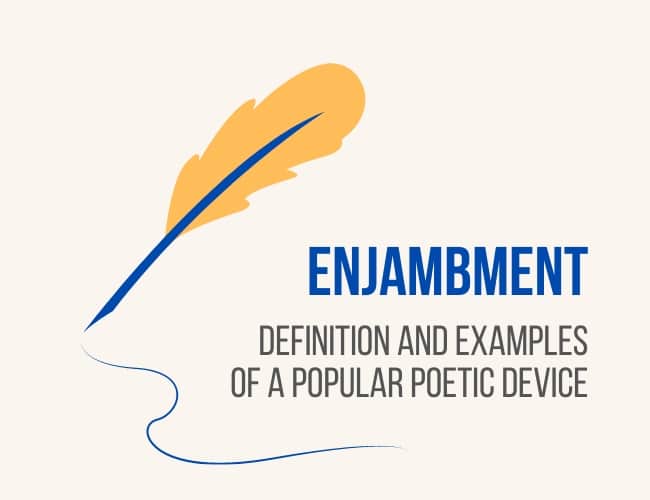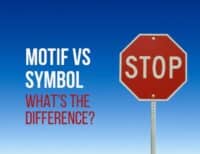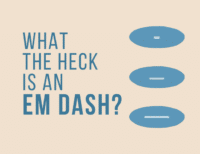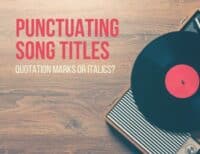When you think about the literary devices that poets use, you might think of rhyme scheme or metaphors with double meanings. But poets also use line breaks and punctuation in unusual ways too. Let's look at one such poetic device called enjambment and then we'll look at some enjambment examples.

Enjambment Definition
The word enjambment comes from the French enjambement, which means to step over or put legs across.
Enjambment in poetry refers to the practice of running lines of poetry from one to the next without using any kind of punctuation to indicate a stop (periods, commas, etc.). As a technique, poets can use it on just a couple of lines or sustain it for an entire poem, depending on their style and preference.
Enjambment Examples
One classic example of enjambment comes from Robert Frost’s poem “The Road Not Taken.” The opening stanza reads:
“Two roads diverged in a yellow wood,
And sorry I could not travel both
And be one traveler, long I stood
And looked down one as far as I could
To where it bent in the undergrowth;”
Look at the lines in the middle that all begin with “And.” See how the lines are connected, but there is a lack of punctuation. The reader must move from one line to the next without pause. Why does Frost (or any poet) use enjambment this way?
We can't know for sure, but this sentence, broken into several lines, keeps giving the illusion of closure with the end of the line when it picks up again. The image keeps going (kind of like the road and the traveler's inability to choose.)
Another example, this from William Shakespeare's Romeo and Juliet (notice the third and fourth lines):
When he shall die,
Take him and cut him out in little stars,
And he will make the face of heaven so fine
That all the world will be in love with night
And pay no worship to the garish sun.
Enjambment forces the reader's eye to the next line before they've completely processed the thought, creating tension between word and idea. Juliet in this scene is desperate for news from Nurse about Romeo, and the line breaks work with her dramatic description of his affect on the world.
(Shakespeare was also using the breaks to maintain iambic pentameter, the rhythm created by the strict meter of the lines–soemtimes in what's also known as blank verse. But that's another article.)
Why use enjambment?
So now that you know what enjambment is, why should you use it? Well, enjambment can help create a certain kind of flow in your poetry. By cutting a thought off without punctuation, it keeps the poem rolling forward and allows ideas to jump over each other. This makes the poem feel more alive and creates an exciting rhythm for readers.
It can also be used to surprise the reader. An idea is presented in the first line of the enjambment, only to be met with a conflicting or contrasting conclusion in the second line. Enjambed lines can also allow for a freer flow of sentences or deas, or continued enforcement of the poem's main idea without the encumbrance of punctuation that is often deemed optional in poetry anyway.
The Opposite of Enjambment: End-stopped
The opposite of enjambment is end-stopped lines, when a line in a poem ends with a period, comma, or other punctuation mark.
Here's an example of end-stopped lines from Shakespeare's Julius Ceasar:
Cowards die many times before their deaths;
The valiant never taste of death but once.
Of all the wonders that I yet have heard,
It seems to me most strange that men should fear;
Seeing that death, a necessary end,
Will come when it will come.
This speech spoken by Julius Caesar stops at the end of each line, creating a harsh, clipped speech. This mirrors his own irritation with the people around him and foreshadows his own end (that is certainly coming sooner than he thinks!)
Now that you've seen a number of examples of enjambment, it's your turn to play with the unexpected beats that a break between lines can create. How might you surprise your reader by breaking an idea in the middle of lines or sentences?
Have you ever written poetry with enjambment? Does your favorite poem use enjambment? Share in the comments.
Need more grammar help? My favorite tool that helps find grammar problems and even generates reports to help improve my writing is ProWritingAid. Works with Word, Scrivener, Google Docs, and web browsers. Also, be sure to use my coupon code to get 20 percent off: WritePractice20
PRACTICE
Write for fifteen minutes using enjambment generously. Split ideas across multiple lines, and add some twists and turns to those ideas. Post your practice in the Pro Practice Workshop here, and leave feedback for a few other writers.







This is Jersey,
Facing out against the Atlantic like a crooked middle finger
This is
Concrete
Pop beat
Summer heat
Jersey
This is Jersey:
Honking at dented convertibles on the highway
This is
Two plus two
Fuck you
Black and blue
Jersey
This is Jersey:
Memories of blue-collar ghettos floating around my father’s head
This is
Stretched out hours
Grimy flowers
Twisted vowels
Joi-sey
This is Jersey:
Sitting on the front stoop, as the world goes around and around
This is
Football teams
Cheap seams
Steel beams
Jersey
This is Jersey:
Watching movies on Friday night about people you wish you were
This is
Square suburb
White noise hubbub
Slowly grow up
Jersey
Ditto to my comments to Franci.
Wow. Loved the images, the rhthym. Enjoyed studying it and imagining the connections. Thanks.
Oops! Sorry, hit the wrong button!
I like the quick, short lines, moving the reader through Jersey as on a fast freeway, everything a blur in memory.
Loved the stop-and-go of it. That trafficky, staccato quality of the poem is fitting for its subject.
(Accidentally posted this down below!)
Love this…great writing!
I squint one eye
when the sky layers tangerine blood on its black-blue body
and into the oval frame of the plane,
and I melt the layers,
with squint and then focus,
melt and cool the layers,
blur and deblur the morning’s
ascending spectrum of brightness.
I squint two eyes
at the man to my right, his spider legs tied close in an X,
caterpillar brow inching with each roll
of each yolk eye,
his layers, leather
layers miles thick
as the black-blue night
sans tangerine peel
but then
the oval spills
and I follow the drip
from cloud
to glass
to leather
and freeze
on my neighbor’s glow,
his bask cautious
with thanks
and I,
thinly layered I,
avert my eyes and whip
myself for not doing the same.
Wow. Loved the images. Enjoyed studying it. Thanks.
I am new to writing free verse and would appreciate any comments.
ADDICTION
Early morning pain
stronger, more insistent
a sharp reminder
that someday this body
will need more help
than he can give
That someday I may
be alone, a widow.
Children miles away,
friends–few if any–
as bad or worse off
This tendency to despair,
to see gloom and darkness
increases the fear, yet…
I need these minutes
like an addict needs his hit,
these minutes of indulgence,
of wallowing, to sink
to the lower depths
into the muck of self-pity
before I climb upward and out
I love the poem and I think the thoughts and sentiments expressed are poignant and extremely relatable. I would suggest capitalizing the first words of the second and third lines though to lend more emphasis, and getting rid of the period in the eighth line since you don’t use them anywhere else in the poem. Content-wise it’s a fantastic reflection on aging, and balancing weakness and strength. I love the humanist perspective 🙂
Thank you for your helpful suggestions on punctuation. Knowing there isn’t anything anyone can do about aging, I am trying to keep my sense of balance and humor.
Thanks for your comments.
Remarkable. My mother recently passed away at age 82. The last 2 months of her life were intensely informing to me (about the experience of end of life) and the last 2 days with her were truly sacred.
Your stark check into reality for so many, allowing the fears to be acknowledged and told, felt very freeing. Those minutes of self-pity and release, if welcomed and cared for, can nourish the soul and, at tear’s end, lighten the heart.
Thanks.
Thank yoiu, Susan, for both your replies. Being new at writing free verse, I’m not quite sure where to place the line. All I have to go on is my instinct and the sound of the line.
I like where you chose to split each line. It makes your message even more powerful because it focuses the eye and the mind.
Thank you, Victoria. I appreciate your reply.
I think you used enjambment
really well here to carry your idea through this poem and release it in the
last pair of lines. That’s what enjambment is for, really; to push the reader
on. Lovely poem.
A tribute to a friend’s father who had a remarkable life, including growing up in Yosemite (and a friendship with Ansel Adams).
I am the land
I am the land
The rough grey granite is my beard
accenting the landscape of my face
The wind is the freedom of my spirit
how I feel when I’m out in nature, my home, my element
gliding, twirling, flowing, connecting with another on the dance floor
Green, lush, expansive meadows
hold my private thoughts and experiences
mine only to know but offered for all to imagine
Yosemite – the backyard of a wide-eyed, adventurous young boy
enraptured by the expanse and enormity…massive and monumental
aware of the infinitesimal
The immense, majestic Sequoias are my strength
the strength to serve, support, protect, and sacrifice
the depth of my roots, my family – generations behind and in front
grounded in the land
The contours and the crests of the mountains
solid, grounded, trustworthy, knowing
train my body and mind and confidence to find my way
lift my spirit
See me. I am the land…there for all to discover.
love that line “the rough grey granite is my beard…” nice portrait, sounds like a wonderful guy!
Thank you. A wonderful picture of him camping in Yosemite inspired this poem, and that line was truly my first thought after I saw his face, holding stories of his lifetime of connections to the land.
I have not been to Yosemite, but have seen a number of documentaries and films on the park. Your poem beautifully fits what I imagine.
Thanks!
A simple thank you to my girlfriends.
I think of you…
…when I drink a cup of coffee
I see us relaxing, laughing and sharing life’s stories
…when I cook
I see us preparing, chopping, mixing together
…when I eat
I see us enjoying a delicious meal together
…when I wash dishes
I see us splitting the tasks to make the job go faster
…when I watch my son
I see your children as they are growing up
…when my husband, son and I play
I see our families enjoying time together
…when I plan a vacation
I see your home as our destination
…when I need to mull over life’s challenges
I see caring, supportive, thoughtful confidants
…when my son talks about his “cousins”
I see family
…often
I see my best friends
FYI – I see the spacing didn’t hold on these two entries. In both “I think of you” and “I am the land”, the second/third lines of each are indented, not flush with the first line.
HYMN OF LOST THINGS
I drove my soul
(oh sings my soul)
into the corners of my apartment,
into cracks of wood
that line the floor.
I drove my soul
(my soul, my soul)
in the gentle lights that hang
like bright fruit.
I drove my soul
into blackened-burnt pots,
Brillo pads, Apache-red pumps,
hotel pens, bobby-pins, socks.
Once, I let you drive my soul,
and if that is a sin
(God forgive me),
I knew nothing else.
But now, I drive my soul
into the sea, the sky,
and it over-
flows.
I drive my soul
into fog and rivers,
into the things that grow
beneath my feet—
and my soul sings.
So if anyone asks,
tell them God passed by
in his Sunday hat
to relieve us of past sins,
and I waved,
and he waved back.
I like the transition from the acquisition of material things to the appreciation of nature and an infinite being.
Yes, Adelaide, it’s really about misplaced desires and hopes—and how we find them again.
Very nice piece Victoria! The imagery, the feeling all well done. You are quite a crater of words. Keep up the good work!
Thanks, Miriam!
I *have* used enjambment. Although I didn’t know that’s what I was doing when I was doing it. And I also didn’t know that poets usually use enjambment to play on reader expectations. That’s neat.
So my accidental enjambment is in my poem “Ode To My Crappy Apartment” which is a parody of John Keats’s “Ode on a Grecian Urn” which I wrote for a blog challenge post.
In case you’re interested, the poem’s at: http://mandywallace.com/ode-to-my-crappy-apartment/
I’d be interested in reading more about poetry, Liz. After writing my Ode as a joke, I found out that the poetry process is very rewarding! Looking for you on Twitter.
i do not know what you think about this, it is a trial after reading your article. thanks.
As hard as it may seem the pain
Bolstering in anguish, we see the gain
Grim around the face brims
Nothing in mind remembers now
Far away in land beyond the shores
We hate the cause, yet revelling in sorrow
Never again seen is the gory
Glory is what the soul frowns
For gain we dread as though it is not right
As suffering the childhood beholds
Shrouded in rags, fitness clouded
Worry my senses overcome some day
can someone tell where i can find an example of enjambment in the poem Casabianca by Felicia Dorothea Hemans